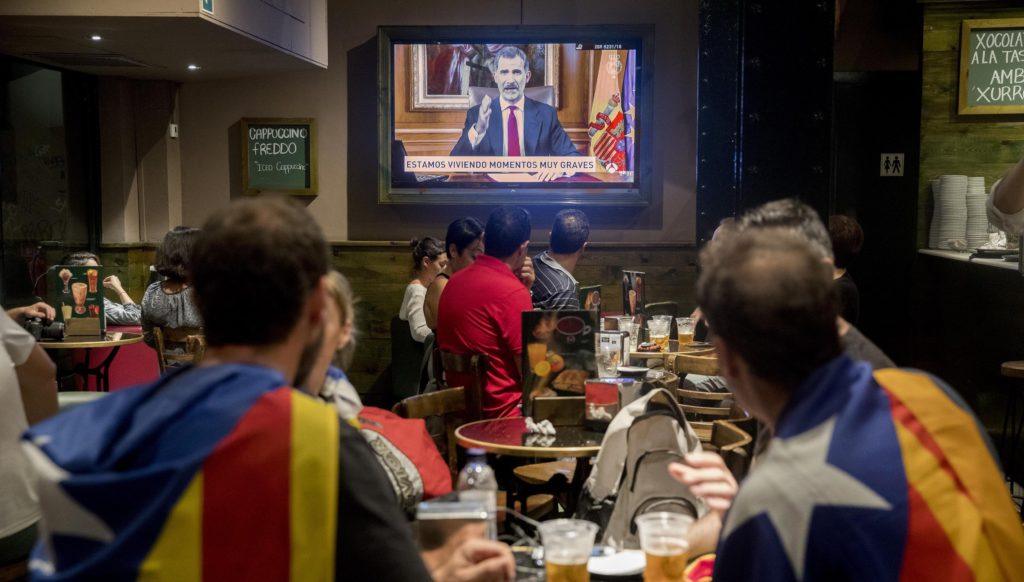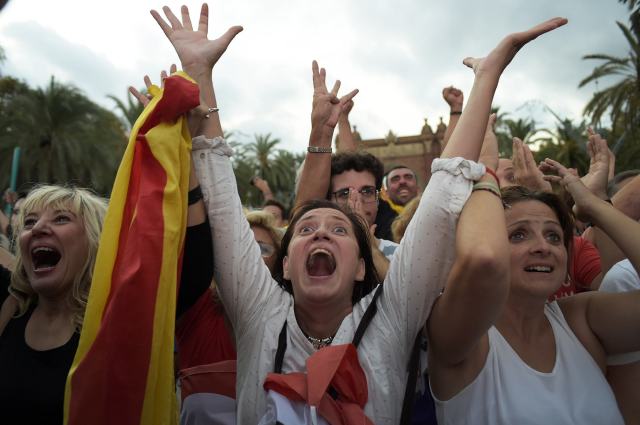
Spain celebrates its national day tomorrow. This is rather unfortunate timing for the annual fiesta of flag-waving and military parading given that its richest region has just declared its intention to secede. Yet this simple idea of a day of patriotic pride, plagued by rows since being established 99 years ago, serves to underscore the fissures bubbling beneath the Iberian surface. For there has been endless sparring between left and right, royalists and republicans, imperialists and progressives, nationalists and separatists over how they should define their fractious nation.
So what will be the shape of Spain on its 100th national day? Will Catalonia have been severed from the state, taking one of the world’s most romantic cities and finest football teams into a new European nation? Yesterday its president Carles Puigdemont pulled back from the brink although remains set on a path to ‘freedom’. Yet three months ago many assumed the boil of separatism had been lanced as support fell to its lowest level for five years. Since then, canny politicians in Barcelona aided by woeful ineptitude in Madrid have inflamed the spirit of independence in the country’s economic engine.
As populism in various guises sweeps through one country after another, Catalonia proves again that almost nothing is predictable in Western politics. First Brexit, then Donald Trump, now this nationalist eruption in a wealthy north-east corner of Spain. Once again, we hear the simplistic myths being spun. Politicians exploit frustrations of voters by promising a better future based on spurious concepts of taking back control from corrupt and distant elites. And in Spain, as in Britain and the United States, the roots of these events go back to the 2008 global financial crisis.
Yet democracy has been good for Spain. The death of General Franco in 1975 was followed by popular endorsement of a constitution giving strong self-determination to Catalonia and other regions, along with rollout of a welfare state. This sparked a significant rise in prosperity – until the banking crisis pricked a housing bubble that had inflated to hideous proportions. Despite this setback, income per head rose more than tenfold in the four decades after fascist dictatorship, while life expectancy for women increased by an impressive 12 years (to the longest in Europe).
As prosperity soared, Catalonian enthusiasm for independence wilted. It had about 16% backing from the population before the crash, then began to creep up towards 20% in 2009 before more than doubling over following years as impact of economic distress and unemployment was exacerbated by tough cuts. The regional health service was hit hard with entire floors of hospitals shut down. Nationalist claims that wealth of the country’s biggest contributor was being ‘robbed’ by the rest of Spain gained traction, especially amid appalling corruption. Yet even at peak, the separatist cause never quite reached majority support in official polling.
Voters losing their jobs, seeing wages fall and struggling to pay bills were infuriated to witness big bank bailouts as public services were slashed. Their anger was entirely understandable. Claims of alleged grievances on culture and language also became louder, fanned by fiscal collapse. Yet reporting from Barcelona this week, it was easy to forget nationalism was in retreat this summer with Spain’s economy performing better than its three bigger European Union rivals. One official famously predicted it would “sink like a souffle” once jobs began being created – and he seemed to be proved right as unemployment slid down to almost half its 24% peak in Catalonia and support for secession slipped. Until now.
Puigdemont has played his hand smartly, aided by the blundering of a weak government in Madrid and scenes of shocking brutality by Spanish riot police. I spoke in Girona and Barcelona to one middle-aged women thrown down stairs and another pulled along by her hair; to a retired man with stitches in a nasty head wound; to a police officer angry after being attacked by fellow officers; even to a German man beaten as he helped protect a polling station. Attacks on peaceful people simply trying to vote, regardless of the referendum’s legal status, reinforced claims Madrid is contemptuous of Catalans and caused deep anger on the streets.
Hopefully this is not a foretaste of the future, especially given the twentieth-century history of Spain. The crisis was worsened by King Felipe. In a rare televised speech he failed to promote unity, speak Catalan or condemn police actions. Many people also mentioned to me the contrast between David Cameron defeating Scottish independence through offering a formal vote and his fellow conservative Mariano Rajoy blocking ballots for Catalonia. Like the Scots, the prosperous Catalans are not an oppressed people, as claimed by politicians preaching the divisive creed of nationalism, even organising schooling in their own language. Nor would they relish the economic and social costs of enforced EU exile.
The threatened flight of firms and tourists makes even some separatists worry about independence. For those of us enduring the self-defeating stupidity of Brexit, the arguments aired by Catalonian separatists are wearily-familiar. There is the simplistic idea of complex problems in a globalised world being solved by taking back control from external foes; that the electorate is failed by distant elites; that prosperity for ordinary people is choked by ‘other’ politicians; and that the only true patriots are those promoting division. The issue also divides families, friends and communities.

These populists look to the past to fight the present. Yet there are two intriguing twists on Brexit. First, many of the most fervent fans of independence are younger people – presumably a legacy of generations schooled in nationalist narratives. And second, that while much of the Catalan case is about getting back ‘their’ money, just like the one made by Brexiteers, many of those making the argument are left-wing republicans opposing policies that redistribute wealth to poorer parts of Spain. Puigdemont is even propped up in government by the hard left. Few saw the irony when I raised this with passionate separatists.
As Rajoy plays cat-and-mouse with the Catalans, challenging their leader to clarify if he has declared independence under threat of imposing direct control from Madrid, this Spanish saga has a long way to run. It exposes again the corrosive nature of nationalism, along with the urgent need for politicians to throttle snake-oil populism by tackling genuine concerns held by unsettled electorates. Above all, it shows how waves unleashed by fiscal meltdown almost a decade ago are still ripping across the West with such disruptive and unpredictable consequences.










Join the discussion
Join like minded readers that support our journalism by becoming a paid subscriber
To join the discussion in the comments, become a paid subscriber.
Join like minded readers that support our journalism, read unlimited articles and enjoy other subscriber-only benefits.
Subscribe